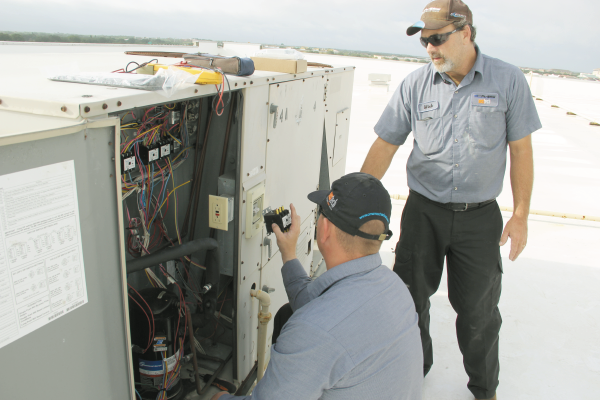The HOW-TO on setting up your own mentorship or apprenticeship program
For companies trying to address the skills gap, do in-house training options work? Retail Store Maintenance spoke to two companies that have explored mentorships and apprenticeships with great results.
When Justin Shannon was hired as Maintenance Coordinator at The Fresh Market, Inc., he was charged with developing an in-house mentorship program, which operates 180 stores. Based in North Carolina, his schedule now includes travelling to work one-on-one with regional maintenance coordinator mentees in other cities.
“It starts out heavy the first few weeks, with a lot of hands-on training. Then they’re more on their own. I’ll spend a week with them once a month for more in-depth training on paperwork and project work,” he said.
Besides bringing new employees up to speed quickly, the program lets mentees make suggestions and discuss their own approaches to daily tasks and problem solving. “I might learn a better way, a faster way to do something from them, so it works both ways,” he said. “You’re a mentor, but any time you’re interacting with a person, you’re learning something, if you’re doing it right.”
And the mentees like the process. “The training I received was informative and productive. It was hands-on and well organized,” said Teri Newman, one of the Regional Maintenance Coordinators who has gone through the program.
“Justin had it structured and well organized; the time and up-front prep work Justin had done made a big difference in the quality of the training,” said another mentee, Andre Mailliez. “The fact that Justin was doing the job currently allowed him to be the subject matter expert and make it very relatable to your situation.”
While Shannon himself was being trained, he kept a notebook to keep track of details. “My boss noticed that and said, ‘That’s a great idea; Is that something we could standardize for your position?’ So my notebook turned into the training manual,” he said. “It started out as a quarter-inch binder and now it’s about two inches thick – a couple of hundred pages.”
The manual is constantly being updated with new information, including feedback from the mentees. Beginning with such simple material as a daily schedule template and vendor contacts, it eventually evolved into “step-by-step instructions for everyday tasks and detailed descriptions on troubleshooting the equipment we have,” Shannon said, noting that “the book pays for itself and the time it took me to make it.”
In fact, since implementing the mentorship program, “we have been able to drastically reduce our maintenance spend. We prevent work orders from happening by providing the source troubleshooting; by reviewing quotes and invoices, we’re reducing costs,” he said. “The store managers were responsible for sourcing their own vendors, calling their own vendors – they were responsible for their own budget. Now we’re taking that out of their hands.”
His top advice? “Be open to who you’re training. Everybody’s different, so something that works for you might not work for somebody else.”
Mentorship is one approach; in the technical trades, a second option is a formal apprenticeship. This is the route chosen by CMS Mechanical Services, which manages facilities asset management and HVAC/R services for numerous large and small retailers across the country.
Although most apprenticeship programs are federally accredited, some are not. “We are in the process of getting our program set up though the Federal Department of Labor,” said CMS Vice-President David Grzech.
“Manual labor has become less popular with younger people entering the workforce in HVAC, probably even more so. CMS Mechanical has been really lucky in that the skills gap that has impacted so many other trades, has not affected us,” Grzech said. “You have a large number of people retiring and only a small number coming in.”
“At CMS Mechanical, we’re able to use the variety of skills we have in our multi-skilled workforce in training apprentices on all aspects of HVAC/R,” Grzech said. CMS Mechanical’s Apprenticeship Program provides high school students and trade-school graduates the opportunity to determine if a career in HVAC/R is right for them as an alternative to the traditional college route where students can amass huge debt. “The candidates we look for need to have the right attitude and aptitude to be selected in the program,” he added. “These young workers see the value in getting no-cost training while they earn their pay. We also have internal employees who started at CMS as maintenance technicians or other positions that are looking to advance their career in HVAC/R through the Apprenticeship Program.”
A year into the program, most candidates are thriving. “The opportunity of a lifetime” is what Apprentice Graduate Daniel Flohr called the program. “It took hours of hard work, but it is something I would do all over again. It gave me the skills and the knowledge to succeed in the HVAC/R industry. It is also a skill no one can take away from you. This past year was just the beginning for me in what it means to me to be a technician. In addition to the Apprenticeship Program, there will be another two years of advanced training and goals to meet.”
“The Apprenticeship Program is awesome. I wish I could have trained like this,” said trainer Mikkel Moon. “To learn from a book while applying it in the field really helps speed up the learning curve on a daily basis.”
Grzech says anyone establishing an apprenticeship needs to consider several necessary criteria, including top-down commitment from all levels of the business and, of course, the cost. “You have to have the financial resources and a reasonable amount of time.”
Apart from the other advantages, “I get personal satisfaction,” Grzech said. “It’s a good way to go out there and get people into a decent paying job without a huge investment.”
“It’s personally very nice to know that you helped develop somebody and helped further that person’s career,” Shannon said. “It’s a good feeling.”
By: Sarah B. Hood


